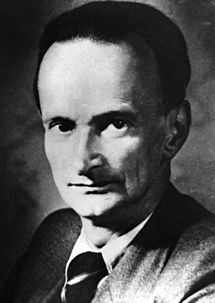Ernst Fischer (writer) facts for kids
Quick facts for kids
Ernst Fischer
|
|
|---|---|

Fischer in 1952
|
|
| Born | 3 July 1899 Komotau, Bohemia, Austria-Hungary (now Chomutov, Czech Republic) |
| Died | 31 July 1972 (aged 73) Deutschfeistritz, Styria, Austria |
| Pen name | Ernst Peter Fischer Peter Wieden Pierre Vidal Der Miesmacher |
| Occupation | Journalist, writer, politician |
| Language | German |
| Education | University of Graz |
| Notable works | The Necessity of Art (1959) |
| Spouse |
Ruth von Mayenburg
(m. 1932; div. 1954)Louise Eisler
(m. 1955) |
| Children | Marina Fischer-Kowalski |
Ernst Fischer (born July 3, 1899 – died July 31, 1972) was an Austrian journalist, writer, and politician. He was born in Bohemia, which is now part of the Czech Republic. He also used several other names, like Ernst Peter Fischer and Peter Wieden.
Contents
Ernst Fischer's Life Story
Ernst Fischer was born in 1899 in a town called Komotau. His father, Josef Fischer, was a colonel and a teacher.
During the First World War, Ernst served as a soldier. After the war, he studied philosophy at the University of Graz. He worked in a factory for a while before becoming a journalist. From 1927, he wrote for a newspaper called Arbeiter-Zeitung.
In 1932, he married Ruth von Mayenburg. At first, Fischer was a social democrat. This means he believed in a political system where the government helps people and society through democratic means. However, he became unhappy with this system because he felt it couldn't stop fascism. Fascism is a type of government led by a dictator who has complete power and often uses force to control people. Because of this, in 1934, Fischer joined the Communist Party of Austria. Communists believe that society should be organized so that everyone is equal and shares resources.
Leaving Austria and Life in Moscow
In 1934, Ernst Fischer and his wife had to leave Austria because of a conflict called the Austrian Civil War. They moved to Czechoslovakia. There, Fischer started working for the Comintern. The Comintern was an international organization that supported communist parties around the world.
In 1938, they moved to Moscow, the capital of Russia, where Fischer continued his work for the Comintern. They lived in a famous place called Hotel Lux. This hotel was a safe place for many communists who had to leave their home countries, especially from Germany, after Adolf Hitler came to power. The Fischers lived there until 1945.
When they arrived in Moscow, a difficult time known as the Great Purge was happening. During this time, many people were arrested and lived in fear. One evening, Fischer learned he was in danger because someone had falsely accused him of being involved in a plot against the leader, Stalin. Even though the accusations were not true, it was a very serious situation. Fischer quickly asked for help from Georgi Dimitrov, an important leader in the Comintern, who was able to protect him.
After the War
After World War II ended, Fischer remained an important figure in the Communist Party of Austria until 1969. He even served as a government minister, in charge of information, from April to December 1945. He also wrote articles for the party's monthly magazine, Weg und Ziel.
Ernst Fischer and his wife divorced in 1954.
He wrote a book called Erinnerungen und Reflexionen (which means "Memories and Reflections"). His ex-wife also wrote a book around the same time, and both books talked about similar periods of their lives.
The Necessity of Art
Ernst Fischer is especially well-known for his book The Necessity of Art, published in 1959. In this book, he explored many ideas about art from a communist viewpoint. He wrote about how art is like work, the difference between art made by groups versus individuals, and different styles of art like formalism and socialist realism.
Fischer's book is a broad essay that looks at the history of art. He discusses how art has changed from ancient times, when it was linked to magic and religion, to the Romantic period, and then to modern art that aims to show reality or help build a socialist society. He believed art should serve society, but not just be government propaganda.
This book has influenced many writers since the late 1950s, including Kenneth Tynan and John Berger.
Ernst Fischer passed away on July 31, 1972, in Deutschfeistritz, Austria.
Books by Ernst Fischer
- Krise der Jugend (1931)
- Freiheit und Diktatur (1934)
- Die Entstehung des österreichischen Volkscharakters (1944)
- Franz Grillparzer (1948)
- Roman in Dialogen (1955) (written with Louise Eisler)
- Von der Notwendigkeit der Kunst (1959) (This was translated into English as The Necessity of Art in 1963)
- Kunst und Koexistenz: Beitrag zu einer modernen marxistischen Ästhetik (1967)
- Was Marx wirklich sagte (1968) (translated as How to Read Marx)
- Erinnerungen und Reflexionen (1969)
- Das Ende einer Illusion (1973)
- Von Grillparzer zu Kafka (1975)
- Born in Austria
See also
 In Spanish: Ernst Fischer para niños
In Spanish: Ernst Fischer para niños
 | Chris Smalls |
 | Fred Hampton |
 | Ralph Abernathy |

